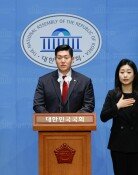[Editorial] Is policy criticism really a canard?
[Editorial] Is policy criticism really a canard?
Posted November. 29, 2000 20:51,
How is it possible at all to regard sound criticisms of the administration`s financial policies as acts of spreading groundless, wild rumors? The National Police Agency (NPA)`s release of the guidelines Tuesday to crack down on acts of spreading pernicious canard conjures up the image of the police behaviors during the dictatorial military regimes of the past. The guidelines are not only vague but also lack any specific criteria, which will make the crackdown ineffective. We suspect that police intended this merely as a bluff. In a nutshell, the crackdown measures appear to be the product of the police force`s lamentable idea to forestall people`s criticism of the ruling power.
The NPA stated that reprehensible acts of spreading wild rumors have reached serious proportions, creating social unrest and economic uncertainties. Thus, it warned that police will launch an all-out campaign until the year`s end to crack down on all rumor-mongers contributing to political unrest, labor disputes and criticisms of financial policies. For the drive, the NPA obviously is planning to mobilize all the nation`s police forces, including its officers working in police boxes or their outposts.
Needless to say, we need to have stern regulations and control over willful acts of evil-minded individuals who spread groundless canard with the intention of creating social unrest and distrust among different social strata. Recent cases of acts of terror, in particular, in cyber-space have reached dangerous proportions by abusing personal computers¡¯ easy concealment of individual identities.
But, the NPA`s crackdown measures Tuesday are poles apart from such proper functions of the police. No amount of benefit of the doubt can put to rest our suspicions about the NPA`s intentions here. Included in the police`s new measures to regulate are acts creating political mischief and criticizing the administration`s financial policies. This clearly indicates that the NPA`s move this time was politically motivated.
We should like to ask police: what constitutes an act of creating political unrest and what distinguishes criticism and critique from canard? Is there any legal ground to punish individuals` policy criticisms or, for that matter, acts fomenting political unrest? Is it not the case that the NPA`s
real intention behind its sudden move to punish rumor-mongers is to silence many rumors that are now being circulated over President Kim`s winning of the Nobel Peace Prize and to neutralize the fallout from the ensuing financial scandals?
It is not unusual to see the dissemination of groundless rumors as temporary, pathological phenomena in a society that is yet to achieve well-refined social integration. Against this background, the fact may partially be explained given that there is no explicit legal stipulations allowing the punishment of such acts of spreading rumors. Our criminal law stipulates a defamation of character punishable either as an act of libel or slander, but the requirements to lay criminal charges against those acts under the law are so meticulous that it is not easy to punish offenders . This is why charges are laid against, for example, libelous handouts under the laws of misdemeanor or the law of advertisements on the outside of buildings, which provides the grounds to punish the distribution of such printed materials without permits.
It is our view that the urgent task of both the government and police is to examine, in the first place, where the cause of such social unrest and economic crisis has originated and come up with remedial measures. They must come to their senses and realize that no amount of drives to crack down rumors will resolve the problem at issue.







